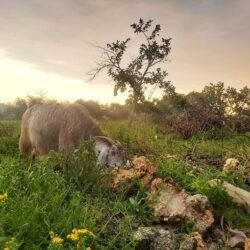Along with this translation (with words of Chinese and Hebrew origin footnoted), I’ve also included some notes on my methodology for developing this dialect I call Tărgŭn Bìyènlìyén Dì (or “Aramaic of Kaifeng”). If you’d like to add to the corpus, let me know! Everything that has yet been developed is included here.
| Source (Aramaic) | Translation (Tărgŭn Bìyènlìyén Dì, romanized) | Translation (Tărgŭn Bìyènlìyén Dì, hebraicized) | Translation (English) |
|---|---|---|---|
חַד גַּדְיָא, חַד גַּדְיָא. דְּזַבִּן אַבָּא בִּתְרֵי זוּזֵי, חַד גַּדְיָא, חַד גַּדְיָא. |
הַ֨דֵ֬י גַ֬דִ֖יַ֬א, הַ֨דֵ֬י גַ֬דִ֖יַ֬א בַ֬בַ֥א זַ֬בֵ֬ן דַ֨וַ֬ר וִ֖סִ֥דִ֖י טִ֖רֵ֬י גֵ֥ׄן דִ֖י הַ֨דֵ֬י גַ֬דִ֖יַ֬א, הַ֨דֵ֬י גַ֬דִ֖יַ֬א |
One little goat, one little goat that my father bought for two zuzim. One little goat, one little goat. | |
וְאָתָא שֻׁנְרָא וְאָכְלָה לְגַדְיָא, דְּזַבִּן אַבָּא בִּתְרֵי זוּזֵי, חַד גַּדְיָא, חַד גַּדְיָא. |
וִ֖מַ֨ו מַ֥דֵ֨י דַ֨וַ֬ר וִ֖מִ֬הַ֬ר נַ֖אֵ֬י גַ֬דִ֖יַ֬א בַ֬בַ֥א זַ֬בֵ֬ן וִ֖סִ֥דִ֖י טִ֖רֵ֬י גֵ֥ׄן דִ֖י הַ֨דֵ֬י גַ֬דִ֖יַ֬א, הַ֨דֵ֬י גַ֬דִ֖יַ֬א |
A cat came and ate the goat that my father bought for two zuzim. One little goat, one little goat. | |
וְאָתָא כַּלְבָּא וְנָשַׁךְ לְשֻׁנְרָא, דְּאָכְלָה לְגַדְיָא, דְּזַבִּן אַבָּא בִּתְרֵי זוּזֵי, חַד גַּדְיָא, חַד גַּדְיָא. |
wì-gŏ[6] From 狗 gŏu mádē dāwăr wì-nĭhĕtì nà-ĕi māw mĭhăr nà-ĕi gădìyă dì băbá zăbĕn wì-sídì tìr-ĕi qén dì hād-ĕi gădìyă, hād-ĕi gădìyă |
וִ֖ג֬וֹ מַ֥דֵ֨י דַ֨וַ֬ר נִ֬הֵ֬תִ֖י נַ֖אֵ֬י מַ֨ו מִ֬הַ֬ר נַ֖אֵ֬י גַ֬דִ֖יַ֬א דִ֖י בַ֬בַ֥א זַ֬בֵ֬ן וִ֖סִ֥דִ֖י טִ֖רֵ֬י גֵ֥ׄן דִ֖י הַ֨דֵ֬י גַ֬דִ֖יַ֬א, הַ֨דֵ֬י גַ֬דִ֖יַ֬א |
A dog came and bit the cat that ate the goat that my father bought for two zuzim. One little goat, one little goat. |
וְאָתָא חֻטְרָא וְהִכָּה לְכַלְבָּא, דְּנָשַׁךְ לְשֻׁנְרָא, דְּאָכְלָה לְגַדְיָא, דְּזַבִּן אַבָּא בִּתְרֵי זוּזֵי, חַד גַּדְיָא, חַד גַּדְיָא. |
וִ֖גַ֨ן מַ֥דֵ֨י דַ֨וַ֬ר וִ֖דַ֬גִׄ֨י נַ֖אֵ֬י ג֬וֹ נִ֬הֵ֬תִ֖י נַ֖אֵ֬י מַ֨ו דִ֖י מִ֬הַ֬ר נַ֖אֵ֬י גַ֬דִ֖יַ֬א דִ֖י בַ֬בַ֥א זַ֬בֵ֬ן וִ֖סִ֥דִ֖י טִ֖רֵ֬י גֵ֥ׄן דִ֖י הַ֨דֵ֬י גַ֬דִ֖יַ֬א, הַ֨דֵ֬י גַ֬דִ֖יַ֬א |
A stick came and hit the dog that bit the cat that ate the goat that my father bought for two zuzim. One little goat, one little goat. | |
וְאָתָא נוּרָא וְשָׂרַף לְחֻטְרָא, דְּהִכָּה לְכַלְבָּא, דְּנָשַׁךְ לְשֻׁנְרָא, דְּאָכְלָה לְגַדְיָא, דְּזַבִּן אַבָּא בִּתְרֵי זוּזֵי, חַד גַּדְיָא, חַד גַּדְיָא. |
wì-nŭr mádē dāwăr wì-xāw[9] From 燒 shāo nà-ĕi gān dăqī nà-ĕi gŏ dì nĭhĕtì nà-ĕi māw dì mĭhăr nà-ĕi gădìyă dì băbá zăbĕn wì-sídì tìr-ĕi qén dì hād-ĕi gădìyă, hād-ĕi gădìyă |
וִ֖נ֬וּר מַ֥דֵ֨י דַ֨וַ֬ר וִ֖שַ֨ו נַ֖אֵ֬י גַ֨ן דַ֬גִׄ֨י נַ֖אֵ֬י ג֬וֹ דִ֖י נִ֬הֵ֬תִ֖י נַ֖אֵ֬י מַ֨ו דִ֖י מִ֬הַ֬ר נַ֖אֵ֬י גַ֬דִ֖יַ֬א דִ֖י בַ֬בַ֥א זַ֬בֵ֬ן וִ֖סִ֥דִ֖י טִ֖רֵ֬י גֵ֥ׄן דִ֖י הַ֨דֵ֬י גַ֬דִ֖יַ֬א, הַ֨דֵ֬י גַ֬דִ֖יַ֬א |
A fire came and burned the stick that hit the dog that bit the cat that ate the goat that my father bought for two zuzim. One little goat, one little goat. |
וְאָתָא מַיָּא וְכָבָה לְנוּרָא, דְּשָׂרַף לְחֻטְרָא, דְּהִכָּה לְכַלְבָּא, דְּנָשַׁךְ לְשֻׁנְרָא, דְּאָכְלָה לְגַדְיָא, דְּזַבִּן אַבָּא בִּתְרֵי זוּזֵי, חַד גַּדְיָא, חַד גַּדְיָא. |
wì-mĕi mádē dāwăr wì-mìyè[10] From 熄 miè nà-ĕi nŭr xāw nà-ĕi gān dì dăqī nà-ĕi gŏ dì nĭhĕtì nà-ĕi māw dì mĭhăr nà-ĕi gădìyă dì băbá zăbĕn wì-sídì tìr-ĕi qén dì hād-ĕi gădìyă, hād-ĕi gădìyă |
וִ֖מֵ֬י מַ֥דֵ֨י דַ֨וַ֬ר וִ֖מִ֖יֵ֖י נַ֖אֵ֬י נ֬וּר שַ֨ו נַ֖אֵ֬י גַ֨ן דִ֖י דַ֬גִׄ֨י נַ֖אֵ֬י ג֬וֹ דִ֖י נִ֬הֵ֬תִ֖י נַ֖אֵ֬י מַ֨ו דִ֖י מִ֬הַ֬ר נַ֖אֵ֬י גַ֬דִ֖יַ֬א דִ֖י בַ֬בַ֥א זַ֬בֵ֬ן וִ֖סִ֥דִ֖י טִ֖רֵ֬י גֵ֥ׄן דִ֖י הַ֨דֵ֬י גַ֬דִ֖יַ֬א, הַ֨דֵ֬י גַ֬דִ֖יַ֬א |
Water came and put out the fire that burned the stick that hit the dog that bit the cat that ate the goat that my father bought for two zuzim. One little goat, one little goat. |
וְאָתָא תּוֹרָא וְשָׁתָא לְמַיָּא, דְּכָבָה לְנוּרָא, דְּשָׂרַף לְחֻטְרָא, דְּהִכָּה לְכַלְבָּא, דְּנָשַׁךְ לְשֻׁנְרָא, דְּאָכְלָה לְגַדְיָא, דְּזַבִּן אַבָּא בִּתְרֵי זוּזֵי, חַד גַּדְיָא, חַד גַּדְיָא. |
וִ֖נִ֥ו מַ֥דֵ֨י דַ֨וַ֬ר וִ֖הֵ֨י נַ֖אֵ֬י מֵ֬י מִ֖יֵ֖י נַ֖אֵ֬י נ֬וּר דִ֖י שַ֨ו נַ֖אֵ֬י גַ֨ן דִ֖י דַ֬גִׄ֨י נַ֖אֵ֬י ג֬וֹ דִ֖י נִ֬הֵ֬תִ֖י נַ֖אֵ֬י מַ֨ו דִ֖י מִ֬הַ֬ר נַ֖אֵ֬י גַ֬דִ֖יַ֬א דִ֖י בַ֬בַ֥א זַ֬בֵ֬ן וִ֖סִ֥דִ֖י טִ֖רֵ֬י גֵ֥ׄן דִ֖י הַ֨דֵ֬י גַ֬דִ֖יַ֬א, הַ֨דֵ֬י גַ֬דִ֖יַ֬א |
An ox came and drank the water that put out the fire that burned the stick that hit the dog that bit the cat that ate the goat that my father bought for two zuzim. One little goat, one little goat. | |
וְאָתָא הַשּׁוֹחֵט וְשָׁחַט לְתוֹרָא, דְּשָׁתָא לְמַיָּא, דְּכָבָה לְנוּרָא, דְּשָׂרַף לְחֻטְרָא, דְּהִכָּה לְכַלְבָּא, דְּנָשַׁךְ לְשֻׁנְרָא, דְּאָכְלָה לְגַדְיָא, דְּזַבִּן אַבָּא בִּתְרֵי זוּזֵי, חַד גַּדְיָא, חַד גַּדְיָא. |
wì-xōhèdì mádē dāwăr wì-tú[13] From 屠 tú nà-ĕi níw hē nà-ĕi mĕi dì mìyè nà-ĕi nŭr dì xāw nà-ĕi gān dì dăqī nà-ĕi gŏ dì nĭhĕtì nà-ĕi māw dì mĭhăr nà-ĕi gădìyă dì băbá zăbĕn wì-sídì tìr-ĕi qén dì hād-ĕi gădìyă, hād-ĕi gădìyă |
וִ֖שׁ֨וֹחֵ֖ט֖[14] Phonetic: ש֨וֹהֵ֖דִ֖י מַ֥דֵ֨י דַ֨וַ֬ר וִ֖ת֥וּ נַ֖אֵ֬י נִ֥ו הֵ֨י נַ֖אֵ֬י מֵ֬י דִ֖י מִ֖יֵ֖י נַ֖אֵ֬י נ֬וּר דִ֖י שַ֨ו נַ֖אֵ֬י גַ֨ן דִ֖י דַ֬גִׄ֨י נַ֖אֵ֬י ג֬וֹ דִ֖י נִ֬הֵ֬תִ֖י נַ֖אֵ֬י מַ֨ו דִ֖י מִ֬הַ֬ר נַ֖אֵ֬י גַ֬דִ֖יַ֬א דִ֖י בַ֬בַ֥א זַ֬בֵ֬ן וִ֖סִ֥דִ֖י טִ֖רֵ֬י גֵ֥ׄן דִ֖י הַ֨דֵ֬י גַ֬דִ֖יַ֬א, הַ֨דֵ֬י גַ֬דִ֖יַ֬א |
A butcher came and slaughtered the ox that drank the water that put out the fire that burned the stick that hit the dog that bit the cat that ate the goat that my father bought for two zuzim. One little goat, one little goat. |
וְאָתָא מַלְאַךְ־הַמָּ֫וֶת וְשָׁחַט לְשׁוֹחֵט, דְּשָׁחַט לְתוֹרָא, דְּשָׁתָא לְמַיָּא, דְּכָבָה לְנוּרָא, דְּשָׂרַף לְחֻטְרָא, דְּהִכָּה לְכַלְבָּא, דְּנָשַׁךְ לְשֻׁנְרָא, דְּאָכְלָה לְגַדְיָא, דְּזַבִּן אַבָּא בִּתְרֵי זוּזֵי, חַד גַּדְיָא, חַד גַּדְיָא. |
wì-mărăhă măwĕtì mádē dāwăr wì-tú nà-ĕi xōhèdì tú nà-ĕi níw dì hē nà-ĕi mĕi dì mìyè nà-ĕi nŭr dì xāw nà-ĕi gān dì dăqī nà-ĕi gŏ dì nĭhĕtì nà-ĕi māw dì mĭhăr nà-ĕi gădìyă dì băbá zăbĕn wì-sídì tìr-ĕi qén dì hād-ĕi gădìyă, hād-ĕi gădìyă |
וִ֖מַ֬לְאַ֬ךְ הַ֬מַּ֬וֶ֬ת֖[15] Phonetic: מַ֬רַ֬הַ֬א מַ֬וֵ֬תִ֖י מַ֥דֵ֨י דַ֨וַ֬ר וִ֖ת֥וּ נַ֖אֵ֬י שׁ֨וֹחֵ֖ט֖ ת֥וּ נַ֖אֵ֬י נִ֥ו דִ֖י הֵ֨י נַ֖אֵ֬י מֵ֬י דִ֖י מִ֖יֵ֖י נַ֖אֵ֬י נ֬וּר דִ֖י שַ֨ו נַ֖אֵ֬י גַ֨ן דִ֖י דַ֬גִׄ֨י נַ֖אֵ֬י ג֬וֹ דִ֖י נִ֬הֵ֬תִ֖י נַ֖אֵ֬י מַ֨ו דִ֖י מִ֬הַ֬ר נַ֖אֵ֬י גַ֬דִ֖יַ֬א דִ֖י בַ֬בַ֥א זַ֬בֵ֬ן וִ֖סִ֥דִ֖י טִ֖רֵ֬י גֵ֥ׄן דִ֖י הַ֨דֵ֬י גַ֬דִ֖יַ֬א, הַ֨דֵ֬י גַ֬דִ֖יַ֬א |
The Angel of Death came and slaughtered the shoḥet who slaughtered the ox that drank the water that put out the fire that burned the stick that hit the dog that bit the cat that ate the goat that my father bought for two zuzim. One little goat, one little goat. |
וְאָתָא הַקָּדוֹשׁ־בָּרוּךְ־הוּא וְשָׁחַט לְמַלְאַךְ־הַמָּ֫וֶת דְּשָׁחַט לְשׁוֹחֵט, דְּשָׁחַט לְתוֹרָא, דְּשָׁתָא לְמַיָּא, דְּכָבָה לְנוּרָא, דְּשָׂרַף לְחֻטְרָא, דְּהִכָּה לְכַלְבָּא, דְּנָשַׁךְ לְשֻׁנְרָא, דְּאָכְלָה לְגַדְיָא, דְּזַבִּן אַבָּא בִּתְרֵי זוּזֵי, חַד גַּדְיָא, חַד גַּדְיָא. |
wì-kádŏxì bălŭhŭ mádē dāwăr wì-tú nà-ĕi mărăhă măwĕtì tú nà-ĕi xōhèdì dì tú nà-ĕi níw dì hē nà-ĕi mĕi dì mìyè nà-ĕi nŭr dì xāw nà-ĕi gān dì dăqī nà-ĕi gŏ dì nĭhĕtì nà-ĕi māw dì mĭhăr nà-ĕi gădìyă dì băbá zăbĕn wì-sídì tìr-ĕi qén dì hād-ĕi gădìyă, hād-ĕi gădìyă |
וִ֖קָ֥ד֬וֹשׁ֖ בָּ֬ר֬וּךְ־ה֬וּא[16] Phonetic: כַּ֥ד֬וֹשִ֖י בַּ֬ל֬וּה֬וּ מַ֥דֵ֨י דַ֨וַ֬ר וִ֖ת֥וּ נַ֖אֵ֬י מַ֬לְאַ֬ךְ הַ֬מַּ֬וֶ֬ת֖ ת֥וּ נַ֖אֵ֬י שׁ֨וֹחֵ֖ט֖ דִ֖י ת֥וּ נַ֖אֵ֬י נִ֥ו דִ֖י הֵ֨י נַ֖אֵ֬י מֵ֬י דִ֖י מִ֖יֵ֖י נַ֖אֵ֬י נ֬וּר דִ֖י שַ֨ו נַ֖אֵ֬י גַ֨ן דִ֖י דַ֬גִׄ֨י נַ֖אֵ֬י ג֬וֹ דִ֖י נִ֬הֵ֬תִ֖י נַ֖אֵ֬י מַ֨ו דִ֖י מִ֬הַ֬ר נַ֖אֵ֬י גַ֬דִ֖יַ֬א דִ֖י בַ֬בַ֥א זַ֬בֵ֬ן וִ֖סִ֥דִ֖י טִ֖רֵ֬י גֵ֥ׄן דִ֖י הַ֨דֵ֬י גַ֬דִ֖יַ֬א, הַ֨דֵ֬י גַ֬דִ֖יַ֬א |
Then the blessed Holy One came and slaughtered the Angel of Death who slaughtered the shoḥet who slaughtered the ox that drank the water that put out the fire that burned the stick that hit the dog that bit the cat that ate the goat that my father bought for two zuzim. One little goat, one little goat. |
This is the translation of Ḥad Gadya into an invented dialect of Aramaic in Kaifeng by Isaac Gantwerk Mayer.
The earliest known appearance of “Ḥad Gadya,” by an unknown author, can be found, handwritten, in the Prague Haggadah (1526). The Aramaic has been vocalized according to the Prague Haggadah (1590). Besides the transcription of the Aramaic with its vocalization, I have also added an English translation adapted from Eve Levavi Feinstein’s Passover Haggadah translation. –Aharon N. Varady
Notes on Targun Biyenliyen Di (Isaac Gantwerk Mayer 2024)
Notes

“חַד גַּדְיָא | Hād-ĕi Gădìyă (הַ֨דֵ֬י גַ֬דִ֖יַ֬א) — a Tărgŭn Bìyènlìyén Dì translation of Ḥad Gadya derived from an alternate timeline by Isaac Gantwerk Mayer” is shared through the Open Siddur Project with a Creative Commons Attribution-ShareAlike 4.0 International copyleft license.









Leave a Reply